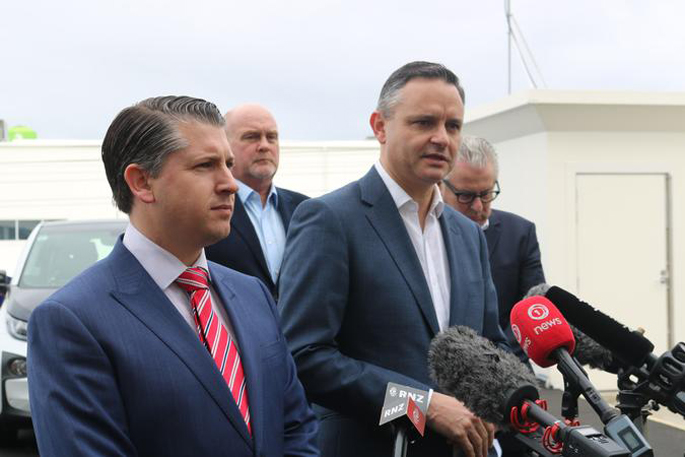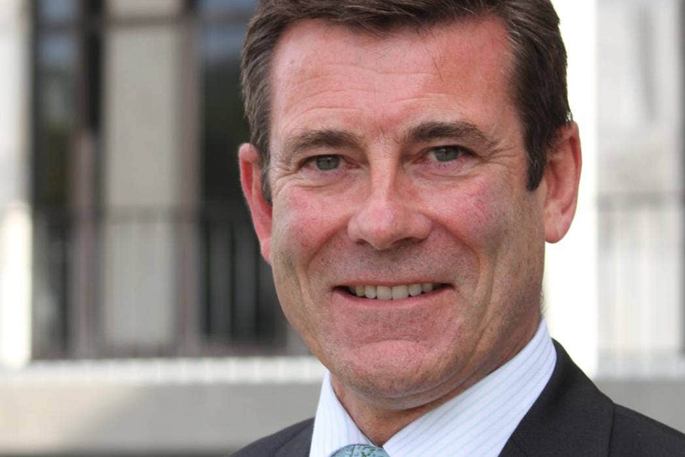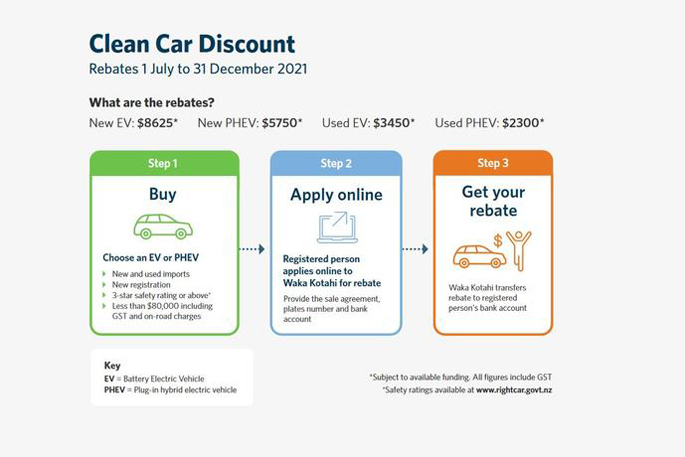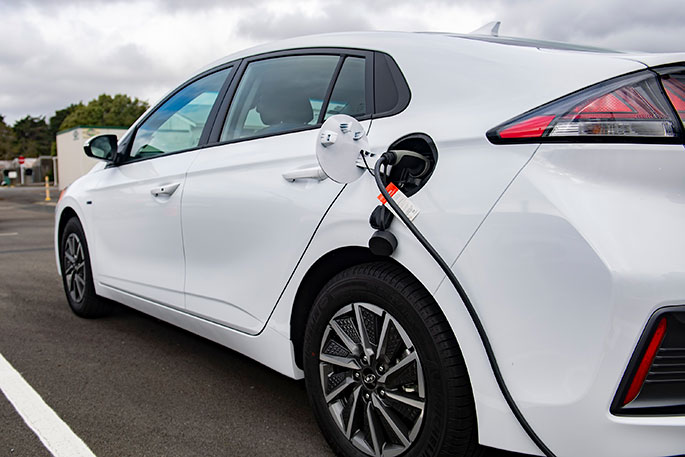People buying new electric and hybrid vehicles will be able to get up to $8625 back from the government, in a rebate scheme announced today.
From 1 July people buying a used imported vehicle with low-emissions will also be able to get up to $3450 back.
Climate Change Minister James Shaw and Transport Minister Michael Wood announced details of the scheme in Auckland this morning.
The scheme will be funded through levies on high-emissions vehicles from January 1, 2022.
Wood says the clean car discount will prevent up to nine million tonnes of carbon dioxide emissions and will help with the up-front cost of switching from petrol-run vehicles.
He says changes have been made to the previous policy, or 'feebate' scheme that was revealed last year, then scuppered by New Zealand First.
"Only cars costing under $80,000 will be eligible for the discount scheme and we will also ensure that only the most safe vehicles are eligible for the scheme."
Shaw says that scheme had, however, laid down some of the groundwork for today's announcement.
"Obviously we weren't able to get it over the line, so it's good that finally we're able to do it," he says.
"I'm really pleased, as climate change minister, that we're able to do this and start putting in place some of the most fundamental shifts that we need over coming years."
He says the rebates would be available from 1 July this year for electric and plug-in hybrids.
The government is also setting up an EV sector leadership group to help to increase the uptake of low emissions vehicles.

Michael Wood, left, and James Shaw at the policy announcement in Auckland. Photo: RNZ/ Katie Todd.
The government says it will cost up to $5175 more to buy a new high-emission car, and up to $2875 more for a used import, like a Ford Ranger or a Toyota Hilux.
From next year some petrol and diesel cars with low emissions will also be eligible for a smaller rebate - such as Suzuki Swift or Honda Jazz - depending on their CO2 emissions.
Wood says overall eight out of the 10 most commonly purchased cars in New Zealand will either be unaffected, or eliglible for a rebate.
He says there are significant benefits to owning an electric vehicle.
"Charging your EV at home off-peak is like buying petrol at around about 40 cents per litre, depending on your electricity retailer. And battery EV motors have so few moving parts that there is less to maintain, and less to go wrong."
Under the government's new clean car scheme there will also be fast EV chargers every 75km along most state highways, and car retailers will need to display emissions information.
Shaw says the last time there was carbon dioxide in the atmosphere in the concentrations present today, there were palm trees in Antarctica.
He says that indicates how urgent it is to deal with emissions.
"Much of that has come from our transport fleet and our transport emissions as a country have been the most rapidly growing of any sector in the economy.
"So dealing with the energy that we use to get around within our cities and between our cities is the most urgent of all our climate change challenges."
He says the Climate Change Commission has also laid down the challenge to arrest emissions.
National Party responds
National's transport spokesperson Michael Woodhouse says the car tax will unfairly punish Kiwis who don't have the option right now of switching to an electric vehicle.
National supports introducing financial incentives for people to purchase EVs but does not agree with financially punishing those who can't, he says.
 National's transport spokesperson Michael Woodhouse. Image: Stuff.
National's transport spokesperson Michael Woodhouse. Image: Stuff.
'Labour is introducing another tax by stealth – plain and simple. Hot on the heels of dressing up its capital gains tax as brightline test extension, it's having a second bite at a car tax.
'Labour's car tax policy will unfairly hurt farmers, tradespeople and low-income earners for whom low-emission vehicles will still be too expensive or unsuitable for their lifestyle.
'The people who benefit will be higher-income earners who now don't have to pay as much for a Tesla. We don't think it's fair to make tradies pay more for a Hilux so wealthy executives can get a discount on their next electric car.
'National believes there are more positive ways we can encourage the uptake of electric vehicles. At the last election we supported moves to exempt EVs from fringe benefit tax, extend road user charge exemptions, allow EV users access to bus lanes and free parking, and provide more funding for development of low-emission technologies.”

Technologies already exist - Sustainable Business
Sustainable Business director Mike Burrell says the technologies already exist to decarbonise the country's light vehicle fleet and the costs are constantly falling.
"The commission's advice shows that the purchase price of a new battery electric vehicle will be cheaper than a petrol car by 2031, or very soon afterwards. Which is all very well - but New Zealand needs to move to lower-emissions transport, including the cars we buy, much sooner than that to meet our climate targets," he says.
Mark Gilbert, chair of Drive Electric, a not-for-profit established aimed at promoting the uptake of EVs, says hundreds of thousands of EVs would be needed to meet the government's climate targets.
He described today's announcement as "monumental" and a "step change".
"This announcement says to global car manufacturers that New Zealand is serious about EVs. We're looking forward to seeing their response, in the form of new ranges and new models, perhaps including utes eventually," he says.
In Wednesday the Climate Change Commission released its final report laying out the roadmap for the country to slash emissions and become carbon neutral by 2050.
Among its recommendations was one saying that nearly all cars imported by 2035 must be electric vehicles.
Greenpeace - More than just electric vehicles needed
Greenpeace says a government rebate for electric and hybrid vehicles is welcome news, but more investment in public transport is needed.
Greenpeace's head of campaigns Amanda Larsson says she hopes the package will be complemented by offering alternatives to cars.
"This is definitely a good step, but it is just a small step, and it would be disappointing if the government put all of its eggs in the electric vehicles basket, because that won't deliver the kinds of emissions reductions that we need to see."
Larsson says petrol and diesel car imports will need to be banned by 2030 to have an impact on transport emissions.
Additional reporting RNZ.



6 comments
This won't work.
Posted on 13-06-2021 17:20 | By The Professor
Undoubtedly the dealers have already put the price for an EV up by up to $8,500. Has the Government planned for the technology.....how long does it take to charge one of these vehicles? How long will the queues be for charging up you EV? Where will the Government get the lost fuel tax from when we are all using EVs? NZ is more and more of a dictatorship each day.
Just cars?
Posted on 13-06-2021 19:15 | By namxa
What about motorcycles? And trucks? And aircraft? And earthmoving machinery? And the manufacturing industry? And coal fired power stations?
It never seems to matter.........
Posted on 13-06-2021 20:26 | By groutby
.......how far you go to appease the wants of the rabid left, in this article Greenpeace, but also the NZ Green party and Labour to an extent will want 'the everything' right now without even a thought as to the consequences moving forward, no clue whatsoever, and when it all goes t*ts up, (and it will) who pays guys?...at what point do you consider that?.
Out of touch
Posted on 14-06-2021 07:16 | By Avgeek
Remember the stories of a used 2011 leaf which cost the owner “just” $13000, only to find the battery was poked and a new battery was going to cost $130,000? SuRe the electrics have a lower footprint if you only look at the output while in use considering we are burning low grade coal to keep up with demand ICE still have a lower whole of life carbon footprint. This welfare for the rich (including not paying to use the road) is a kick in the teeth for average kiwis who, if they do buy their first handmedown EV will likely be screwed with the cost of replacing the battery of disposing..And watch out more for imported used EVs to soar as countries realize the easiest way to dispose of tired EVs without having to consider safe Ways of burying the toxic waste is to sell to NZ
Adjust the GST
Posted on 14-06-2021 08:05 | By david mends
Taking off the GST for these types of electric vehicles would be a better way to lower the initial cost
Clean green batteries
Posted on 13-07-2021 11:44 | By KathFlossy
Just a small question regarding clean green electric cars and buses. What will happen to the huge pile of batteries that will be soon build up as replacements are needed. Have you seen the number needed to power a bus approx 250 Are they recyclable ?
Leave a Comment
You must be logged in to make a comment.